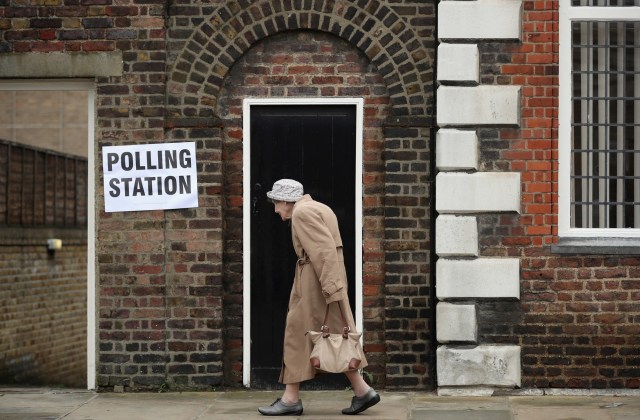(Photo by Dan Kitwood/Getty Images)

In most countries where it has occurred, the surge in support for populism is demographically uneven. Populist movements have tended to do better with men than women, in small towns than big cities, and among blue collar workers than professionals.
And then there’s what could be the most important difference of all: populists, at least those of the nationalist, culturally conservative variety, usually do better among older voters than younger.
Why that should be is a question considered by Edoardo Campanella for Project Syndicate. He blames “insecurity” – mainly of the economic kind:
“Most likely, a growing sense of insecurity is pushing the elderly into the populists’ arms. Leaving aside country-specific peculiarities, nationalist parties all promise to stem global forces that will affect older people disproportionately.
“For example, immigration tends to instill more fear in older voters, because they are usually more attached to traditional values and self-contained communities. Likewise, globalization and technological progress often disrupt traditional or legacy industries, where older workers are more likely to be employed. The rise of the digital economy, dominated by people in their twenties and thirties, is also pushing older workers to the margins.”
That sounds plausible, but economic insecurity is hardly exclusive to older people. Typically, youth unemployment runs at a higher rate than general unemployment. Then there’s the student debt that the young stagger under – and the unaffordability of home ownership.
On these grounds, it should be the young registering protest votes – not the old. And in many countries they’re doing just that – but typically through populist movements of the Left such as Podemos in Spain, the Corbynite wing of the Labour Party in the UK, and the Bernie Sanders tendency in America.
Perhaps, instead of looking to economic insecurity for the main explanation, we should look to cultural insecurity. The young have less reason to feel culturally insecure – they’re still at an age when everything is new and therefore fears about the loss of familiarity don’t apply. It also helps when culture – and especially popular culture – revolves around your own age group.
Ironically, the post-war idolisation of youth – and devalorisation of age – began with what is now the older generation. The age group that was the first to be widely referred to as ‘teenagers’ are also the first to be referred to as ‘gammons’ – a nasty little slur designed to invalidate political opinions solely on the basis of the age of those holding them.
Remarkably, the fact that older voters have fewer years left to them than younger voters is offered as a serious argument as to why their votes should count for less – especially on future-facing issues such as Brexit. The idea that many decades of lived experience might give one a valuable perspective on the overall direction of a society is less fashionable.
One of the most poignant graphs I’ve ever seen is part of a series of six that show who Americans spend their time with at different stages of life. The first one is for friends – who we spend the most time with in our teens and then less-and-less as we get older, get jobs, get married, etc. Another chart is for parents and siblings, which naturally peaks in the childhood years before dropping away. Equally to be expected is the chart for time spent with one’s own children, which peaks among thirty-somethings. The chart for co-workers is a long plateau, stretching across one’s working-age years all way until retirement when it suddenly drops away. The heartbreaking final chart is for time spent alone – which is fairly flat until middle age, after which it climbs and climbs and climbs.
The baby-boomers were instrumental in creating a culture based on the values of liberal individualism. They’re now discovering how that ends.
Those of us in younger age groups have a choice: we can either interpret the way our elders vote as sour grapes or as a warning.










Join the discussion
Join like minded readers that support our journalism by becoming a paid subscriber
To join the discussion in the comments, become a paid subscriber.
Join like minded readers that support our journalism, read unlimited articles and enjoy other subscriber-only benefits.
Subscribe